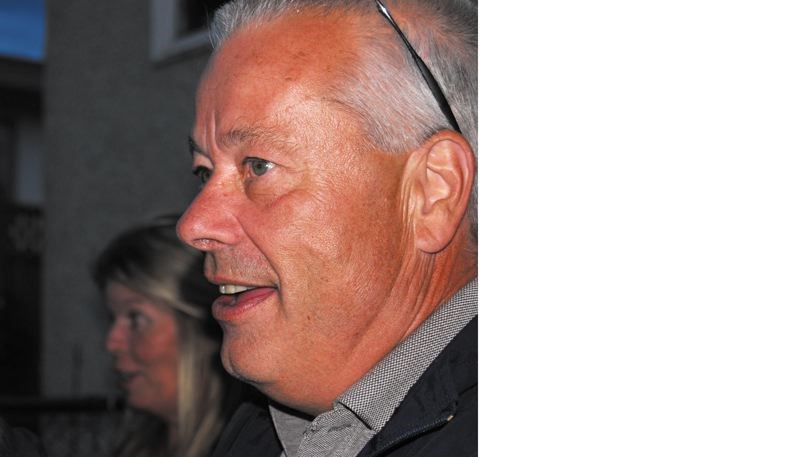The name most deeply associated with starting the city's medical imaging technician program is the name now attached to gathering funds for those students, even though the man himself is now gone.
Dr. Larry Breckon was a one-man medical force in the Prince George community, according to his friends and peers. When he passed away on Dec. 8, it was a void his many loved ones felt deeply. They quickly moved to establish a memorial scholarship fund in his honour.
"All the money we raise goes to a fund to help those who take the two-year medical imaging tech program at CNC. The tuition fee for that program is just shy of $20,000. That blew me away," said Dr. Laurie Cook, one of Breckon's longtime colleagues and a close friend. "We are structuring it so successful applicants can receive a scholarship for their first year of studies and, if they maintain a certain level of academic standing, funding would also be made available to them in their second year."
The CNC program was launched as a response to the Prince George-based Northern Medical Program, which was established to graduate more doctors in the north, for the north. Medical imagining technologists were also a high-demand profession needed to work alongside those doctors. Breckon was one of the early champions of this educational option being established in this region.
Breckon had a particular love for northern B.C. He graduated from medical school in eastern Canada where he was raised. His first posting as a doctor was to communities in Newfoundland. Cook and fellow Dalhousie University classmate Dr. George Haley went the other way, settling in Prince George in 1973 and 1974 respectively. Both of them lobbied Breckon to join them in a land of opportunity they fell into immediate fondness for. He agreed, moving here in 1975. All three were general practitioners.
Breckon and wife Anne raised three children in Prince George, until he left both the city and his G.P. designation in 1986. He decided to switch into the radiology profession, studying back in Newfoundland. Upon completion of his studies, he came right back to Prince George.
"To a large extent, he came back because of the personality of the medical community here," said Haley. "If I was coming out of medical school today and knew what I know now about the places I could have a practice, I wouldn't give any place a second thought except Prince George. And Larry knew that, too."
Breckon fit well with the proactive and above-and-beyond spirit most people in the local medical professions seemed to live by. Cook said Breckon's approach to medicine was infectious as well.
"When he came back and went into medical imaging roles, he did things differently, maybe because of his time spent as a G.P. but mostly just because that's how he was: most people, if you have to go for X-rays, you never even see the radiologist, or only have momentary contact, but Larry was the opposite of that. He made such a point of getting to know people, coming out to interact, and he just never forgot a name."
Haley laughed about how he took over some of Breckon's patients when he first left in 0986 "and some of those people, 20 or 30 years later, they'd still remind me that they were Dr. Breckon's people and I was just the fill-in."
"He did so much for us all. The community at large has no idea what all he did to improve the lives of people in Prince George," said Albert Taylor, the now-retired manager of the hospital imaging department. He was alongside Breckon during the development of the CNC program.
"He was an extraordinary man. He would have been the first one to contribute to a fund to help offset the tuition costs of those students," Taylor said. "Those students make quite a commitment. They have to pay upwards of $18,000 for the two-year course, and when they are dispersed around the north for their practicum positions, they have to pay their own travel costs and pay their own accommodations in those communities."
But the program is working brilliantly, Taylor added. The first cohort of 13 graduates entered the workforce in 2013 and 10 of them got jobs in the northern region.
"Prior to 2011, the only place in the province that taught these skills was BCIT," Taylor said. "There was a chronic shortage of them in northern B.C. because students down there weren't exposed to northern life. Larry knew that if you could train them in the north, too, the chances were much better that those students would stay here, and he was absolutely correct, and we are all benefitting from that today."
To make a donation, visit the CNC website (www.cnc.bc.ca), scroll down the left-hand column and click on the heading Donate To CNC, then click the Ways To Give link. The first option is a link to CanadaHelps.org, and the first scholarship offered by that online form is the Dr. Larry Breckon Memorial Endowment Fund (shortcut:
https://www.canadahelps.org/dn/5725).
Supporters of the fund like Cook, Haley and Taylor hope the public helps build up the fund to make it easier for these important medical professionals to graduate from our home program, and that the members of the medical community in particular contribute to this endowment account.

.png;w=120;h=80;mode=crop)

